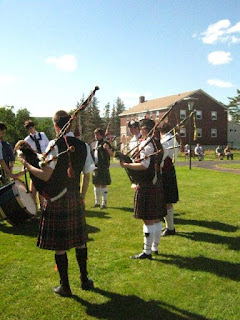Starting on March 11th and running to March 14th
the Gaelic College will be hosting its March-Break youth session. Colin
MacDonald, director of Gaelic language classes at the college spoke to me about
his history with the 78 year-old institution. He attended sessions like the
up-coming March session when he was ten years old, and he played in the college
pipe-band throughout his teens. He has also worked as tour guide for the Gaelic
College museum during the summers. He has a long history with the college, and
now Colin is positioned to welcome perhaps more than 100 young students, between
the ages of 5 and 18, to Gaelic college where they will be immersed in Gaelic
culture for three full days.
The Gaelic College is
an institution that provides expert knowledge and teaching on all these
different aspects of Gaelic Culture and the students who go there are eager to
soak up as much of that culture as they possibly can. Emma Boutilier was one of
those students, and this week I spoke with her about her experience at the
Gaelic College.
“I remember that I
was too excited to be nervous. I had done sleep-away camps before. There were
some people who had never had that experience before and were feeling a little
bit nervous, but the Gaelic College is such a comfortable and friendly
atmosphere that they didn’t feel that way for long.”
Now a student of English literature at the University of New
Brunswick, Emma Boutilier first attended the Gaelic College summer session when
she was fifteen. After that she went back twice more, once for the winter
session and once again in the summer of 2010.
“I really loved it.
All my classes were either bag-piping or Gaelic language, and I would get to
take one other course every time I went. Having the opportunity to learn new
tunes and styles was fantastic. We had really great instructors like Mike
Campbell. I learned a lot of new tunes, and styles like piobaireachd and stathspey.”
The students are all given the chance to perform what they
have learned in a variety show at the end of the session.
The Gaelic College has not usually been open-year round. It
opens its doors to students for weeks at a time, like for the up-coming March
Session, and for groups that wish to rent out the facilities. However, as Colin
MacDonald explained to me, the Gaelic College will soon be living up to its
name. Students at Cape Breton University are now able to enroll in a four-week
immersion program.
This program earns the students six credits toward their CBU
degrees, but are also transferrable to any university in Nova Scotia. It may not be long before the Gaelic College
starts to offer year-round programming to anyone who wishes to take part in the
on-going efforts to preserve and perpetuate Gaelic culture in Nova Scotia.
Gach deagh dhùrachd / Every good wish!
Colin's favorite word in Gaelic is: Cànan / Language
Colin's favorite word in Gaelic is: Cànan / Language



